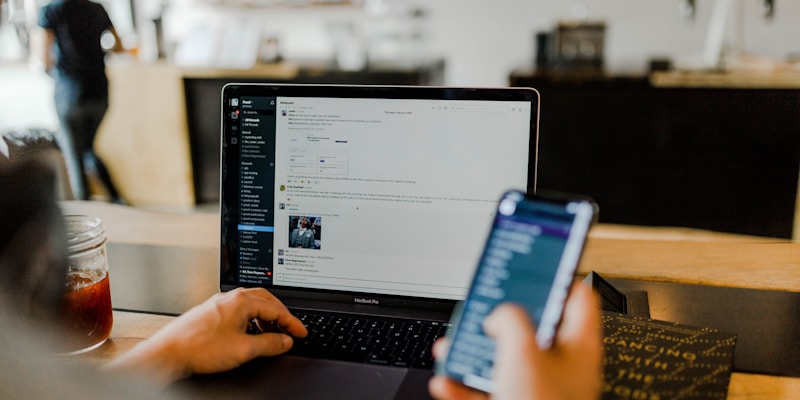In today's digital age, protecting yourself online is more important than ever. With cyber threats evolving constantly, understanding how to safeguard your personal information, privacy, and digital identity is essential. This comprehensive guide will walk you through the most effective ways to stay safe on the internet.
1. Use Strong, Unique Passwords

Your passwords are the first line of defense against unauthorized access to your accounts. Weak or reused passwords are one of the most common ways hackers gain access to personal information.
Best Password Practices:
- Length matters: Use at least 12-16 characters
- Mix it up: Combine uppercase, lowercase, numbers, and symbols
- Avoid personal info: Don't use birthdays, names, or common words
- Unique for each account: Never reuse passwords across different sites
- Use a password manager: Tools like Bitwarden, 1Password, or LastPass can generate and store strong passwords securely
2. Enable Two-Factor Authentication (2FA)

Two-factor authentication adds an extra layer of security by requiring a second form of verification beyond your password. Even if someone steals your password, they won't be able to access your account without the second factor.
Types of 2FA:
- Authenticator apps: Google Authenticator, Authy, or Microsoft Authenticator (most secure)
- SMS codes: Text message verification (better than nothing, but less secure)
- Hardware keys: Physical devices like YubiKey (highest security)
- Biometric: Fingerprint or face recognition
3. Keep Your Software Updated
Software updates often include critical security patches that fix vulnerabilities hackers could exploit. Keeping your operating system, browsers, and apps updated is one of the simplest yet most effective security measures.
- Enable automatic updates whenever possible
- Update your operating system (Windows, macOS, iOS, Android)
- Keep browsers and plugins current
- Update mobile apps regularly
- Don't ignore security update notifications
4. Be Cautious with Public Wi-Fi

Public Wi-Fi networks in cafes, airports, and hotels are convenient but often unsecured, making them prime targets for hackers to intercept your data.
Public Wi-Fi Safety Tips:
- Use a VPN: Virtual Private Networks encrypt your internet traffic
- Avoid sensitive transactions: Don't do banking or shopping on public networks
- Turn off auto-connect: Disable automatic connection to open networks
- Forget networks: Remove saved public Wi-Fi networks after use
- Use your mobile hotspot: Your cellular data is generally more secure
5. Recognize Phishing Attempts
Phishing is when criminals try to trick you into revealing personal information, passwords, or financial details through fake emails, messages, or websites.
Red Flags to Watch For:
- Urgent or threatening language ("Your account will be closed!")
- Requests for personal information via email
- Suspicious sender addresses (check carefully)
- Generic greetings ("Dear Customer" instead of your name)
- Misspellings and poor grammar
- Suspicious links or attachments
6. Use a VPN for Privacy

A Virtual Private Network (VPN) encrypts your internet connection and masks your IP address, providing privacy and security online.
Benefits of Using a VPN:
- Encrypts your internet traffic
- Hides your IP address and location
- Protects you on public Wi-Fi
- Prevents ISP tracking
- Bypasses geographical restrictions
Popular VPN services include NordVPN, ExpressVPN, Surfshark, and ProtonVPN. Choose reputable providers with strong privacy policies.
7. Secure Your Social Media Accounts
Social media platforms contain vast amounts of personal information. Securing these accounts is crucial for protecting your privacy and identity.
Social Media Security Checklist:
- Review and adjust privacy settings regularly
- Limit who can see your posts and personal information
- Be careful about accepting friend requests from strangers
- Don't overshare personal details (address, phone, travel plans)
- Disable location tagging on posts
- Review third-party app permissions
- Log out of devices you no longer use
8. Protect Your Devices

Your devices are gateways to your digital life. Securing them properly is essential for overall online protection.
Device Security Measures:
- Use screen locks: PIN, password, fingerprint, or face recognition
- Install antivirus software: Especially important for Windows users
- Enable device encryption: Full disk encryption for laptops and desktops
- Enable "Find My Device": For remote tracking and wiping if lost or stolen
- Be careful with downloads: Only download from official app stores and trusted sources
9. Back Up Your Data Regularly
Regular backups protect you from data loss due to hardware failure, ransomware, or accidental deletion.
Backup Best Practices:
- Follow the 3-2-1 rule: 3 copies of data, 2 different media types, 1 offsite
- Use cloud backup services (Google Drive, iCloud, Dropbox)
- Keep external hard drive backups
- Automate backups to ensure consistency
- Test your backups periodically to ensure they work
10. Be Smart About What You Share
Think before you post or share information online. Once something is on the internet, it's nearly impossible to completely remove it.
Your Internet Safety Checklist
- Using strong, unique passwords for all accounts
- Two-factor authentication enabled on important accounts
- Software and operating systems kept up to date
- VPN installed and used on public Wi-Fi
- Antivirus software installed and active
- Social media privacy settings reviewed
- Regular data backups configured
- Cautious about clicking suspicious links
- Password manager in use
- Screen locks enabled on all devices
Final Thoughts
Online security isn't a one-time setup—it's an ongoing practice. Cyber threats evolve constantly, so staying informed and maintaining good security habits is crucial. By implementing these strategies, you'll significantly reduce your risk of falling victim to cybercrime.
Remember: no security measure is 100% foolproof, but layering multiple protections creates a strong defense. Start with the basics, implement them consistently, and gradually add more advanced protections as you become comfortable.
